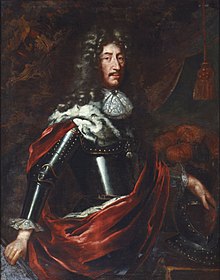Philipp Wilhelm, Elector Palatine
| Philip William | |
|---|---|
| Elector Palatine Count Palatine of Neuburg |
|

Philip William in 1685
|
|
| Born |
24 November 1615 , Gießen, Germany |
| Died | 2 September 1690 (aged 74) Vienna, Austria |
| Burial | Neuburg an der Donau, Germany |
| Spouse |
Anna Catherine Constance Vasa (m. 1642; her death 1651) Landgravine Elisabeth Amalie of Hesse-Darmstadt (m. 1653; his death 1690) |
| Issue Detail |
Eleonor Madeleine, Holy Roman Empress John William, Elector Palatine Charles III Philip, Elector Palatine Alexander Sigismund, Bishop of Augsburg Francis Louis, Archbishop of Trier Maria Sophia, Queen of Portugal Maria Anna, Queen of Spain Dorothea Sophie, Duchess of Parma Hedwig Elisabeth, Princess Sobieski |
| House | Wittelsbach |
| Father | Wolfgang William, Count Palatine of Neuburg |
| Mother | Magdalene of Bavaria |
Philip William of Neuburg, Elector Palatine (German: Philipp Wilhelm) (24 November 1615 – 2 September 1690) was Count Palatine of Neuburg from 1653 to 1690, Duke of Jülich and Berg from 1653 to 1679 and Elector of the Palatinate from 1685 to 1690. He was the son of Wolfgang Wilhelm, Count Palatine of Neuburg and Magdalene of Bavaria.
In 1685, with the death of his Protestant cousin, the Elector Palatine Charles II, Philip William inherited the Electorate of the Palatinate, which thus switched from a Protestant to a Catholic territory. Charles II's sister, now the Duchess of Orléans and Louis XIV's sister-in-law, also claimed the Palatinate. This was the pretext for the French invasion in 1688, which began the Nine Years War.
Philip William married twice. He first married Princess Anna Catherine Constance Vasa, daughter of Sigismund III Vasa and Constance of Austria. The couple had a son who died at birth. Anne Catherine Constance herself died in 1651.
In 1653 Philipp Wilhelm married Elisabeth Amalie of Hesse-Darmstadt. This second marriage lasted 37 years and was regarded as extremely happy. They had 17 children, including the next two Palatine Electors, John William and Charles III Philip, as well as Elector-Archbishop Franz Ludwig von Pfalz-Neuburg. Many of these children have descendants today. In the early years of their marriage, the couple lived in Düsseldorf, where they founded churches and monasteries.
...
Wikipedia
